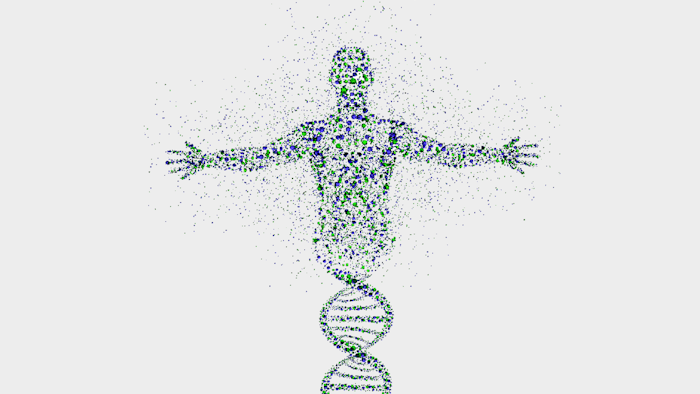
The phrase “Look down your nose” comes from a time when aristocrats were taller than commoners due to their superior nutrition. European elites would literally look down on their inferiors. So it shouldn’t be hard to imagine the shock 19th-century aristocrats experienced, across the Atlantic, encountering well-fed American laborers, artisans, and farmers, who would look at their betters eye-to-eye. In societies where nutrition varies a great deal and correlates with socioeconomic status, like in England during the Industrial Revolution, tall people tend to be of higher socioeconomic status.
Genes play a role, too, of course. Height, as researchers say, is 80 percent “heritable.” Heritability is the variation of a trait in a population—in this case, height—that you can attribute to variation in genes. When height’s heritability, a summary of innumerable complex biological pathways that lay down bone, drops below 80 percent, socioeconomic heritability increases. The elites weren’t taller because of their genes—the commoners were just shorter out of deprivation. The outcomes of this interplay between our genes and our environments, what many refer to as the consequences of nature versus nurture, is being more and more precisely traced and quantified using classical and modern genomic methods. Even for the seemingly more abstract traits that we really care about.
Even the genes that parents don’t give matter.
Take educational attainment, or how much schooling a person has (primary, secondary, etc). It’s a common metric used in social genomics, a field that looks at the relationship between genes and individual and societal outcomes. Compared to height, educational attainment has a more complex set of layers mediating its expression. There’s the raw computational power your brain has. Your personality (how conscientious are you?) As well as the myriad social, political, and cultural forces which buffet the choices you make in terms of when and if to obtain further education. Interestingly, the genes that shape how educated you eventually become don’t necessarily have to be passed on to you.
A new paper, published in the American Journal of Human Genetics, highlights the fact that genes your parents didn’t transmit to you still matter—the phenomenon of “genetic nurture.” A team of researchers based in the United Kingdom conducted a systematic review and meta-analysis of 12 studies with nearly 40,000 parent-offspring comparisons. The genetic nurture effect for years of education, they found, is about 50 percent of the value of direct genetic effects. “Empirical studies,” they write, “have indicated that genetic nurture effects are particularly relevant to the intergenerational transmission of risk for child educational outcomes, which are, in turn, associated with major psychological and health milestones throughout the life course.” Genetic nurture is clearly not a factor you can ignore.
How does it work? Some parents may have personalities that have them prioritizing the short-term over the long-term. Rather than investing in their offspring’s educational outcome, by investing in a college fund, say, they may prefer spending the money on vacations to Europe, which have a great deal of short-term utility. The child may have somewhat different preferences, but this would be irrelevant, as these sorts of decisions are usually made by parents. The same is true in the converse situation, where parents make decisions that would increase the likelihood of their offspring going to college. This is a situation where the offspring may not have inherited the gene (or cluster of genes) that gives their parents the long-term vision, but they themselves benefit from that disposition.
This reality is missed out in classical studies, which look just at the correlation in characteristics between parents and offspring. Obviously parents and offspring can correlate in educational attainment due to factors unrelated to their genetic relationship, but the subtle aspect of genetic nurture is that the genetics of the parent strongly impact the non-genetic inputs into the outcome in the offspring. With modern genomics, we can actually look at which genetic copies are transmitted or not directly, rather than having to guess.
Arguably, given how educational attainment shapes important economic and social outcomes, understanding the forces that drive and impede how educated people become is one of the more important tasks societies should undertake. The findings on genetic nurture underscore the powerful role genetics plays. Every human has two copies of a gene, and they contribute one of their two copies to their offspring. For genetic heritability, the trait varies as a function of the contributed copy; the other copy is irrelevant. For genetic nurture, both copies matter, the transmitted and untransmitted! “Genetic nurture effects,” the researchers write, “were largely explained by observed parental education and socioeconomic status, pointing to their role in environmental pathways shaping child educational outcomes.”
In that sense, genetic effects, via genetic nurture, have a larger scope than some people might have thought. Robert Plomin, a King’s College London behavioral geneticist, has argued, somewhat controversially, that the “most important thing that parents give to their children is their genes.” If Plomin’s right, the systematic review of genetic nurture’s effects on educational attainment wouldn’t detract from his point but make it in another way: Even the genes that parents don’t give matter.
Razib Khan is a population geneticist. Follow him on Twitter @razibkhan.



















